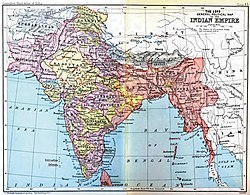Dutch East Indies Company
 |
|
|
Native name
|
Vereenigde Oost-Indische Compagnie (VOC) |
|---|---|
| Publicly traded company | |
| Industry | Trade, manufacturing |
| Fate | Dissolved |
| Predecessor | (Compagnie van Verre, Brabantsche Compagnie, ) |
| Founded | 20 March 1602 |
| Founder | Johan van Oldenbarnevelt |
| Defunct | 31 December 1799 |
| Headquarters | Amsterdam, Dutch Republic Batavia, Dutch East Indies |
|
Area served
|
Europe-Asia (Eurasia) Intra-Asia |
|
Key people
|
Heeren XVII/Gentlemen Seventeen (Dutch Republic, 1602–1799) Governors-General of the Dutch East Indies (Batavia, 1610–1800) |
| Products | Spice, silk, porcelain, metals, , tea, grains (rice, soybeans), sugarcane industry, shipbuilding industry |

Imperial entities of India
|
|
| Dutch India | 1605–1825 |
|---|---|
| Danish India | 1620–1869 |
| French India | 1769–1954 |
|
|
|
| Casa da Índia | 1434–1833 |
| Portuguese East India Company | 1628–1633 |
|
|
|
| East India Company | 1612–1757 |
| Company rule in India | 1757–1858 |
| British Raj | 1858–1947 |
| British rule in Burma | 1824–1948 |
| Princely states | 1721–1949 |
| Partition of India |
1947
|
|
|
|
The United East India Company or the United East Indian Company, also known as the United East Indies Company (Dutch: Vereenigde Oost-Indische Compagnie; or Verenigde Oostindische Compagnie in modern spelling; VOC), referred to by the British as the Dutch East India Company, or sometimes known as the Dutch East Indies Company, was originally established as a chartered company in 1602, when the Dutch government granted it a 21-year monopoly on the Dutch spice trade. It is often considered to be the world's first truly transnational corporation and the first company in history to issue bonds and shares of to the general public. In other words, the VOC was officially the first publicly traded company of the world, because it was the first company to be ever actually listed on an official . As the first historical model of the quasi-fictional concept of the megacorporation, the VOC possessed quasi-governmental powers, including the ability to wage war, imprison and execute convicts, negotiate treaties, strike its own coins, and establish colonies.
The company was also considered by many to be the very first major and the most successful corporation in history. Statistically, the VOC eclipsed all of its rivals in international trade for almost 200 years of existence. Between 1602 and 1796 the VOC sent almost a million Europeans to work in the Asia trade on 4,785 ships, and netted for their efforts more than 2.5 million tons of Asian trade goods. By contrast, the rest of Europe combined sent only 882,412 people from 1500 to 1795, and the fleet of the English (later British) East India Company, the VOC's nearest competitor, was a distant second to its total traffic with 2,690 ships and a mere one-fifth the tonnage of goods carried by the VOC. The VOC enjoyed huge profits from its spice monopoly through most of the 17th century.
...
Wikipedia
